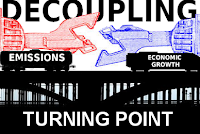The most recent report called "Turning Point,"comes from research prepared for green thinktank Heinrich Böll by DIW Econ, a German institute for economic research.
We known that we can reduce GHG emissions and tackle climate change, and as indicated by the International Energy Association (IEA) in a study called Energy and Climate Change Report 2015, global emissions remained flat in 2014 while global GDP grew. Overall several reports have supported the idea that decoupling emissions from economic growth is possible.
This information is corroborated in the US by the EPA's 20th Inventory of US Greenhouse Gas Emissions and Sinks which indicates that GHGs have declined 9 percent since 2005. During this time the US economy has seen steady and substantial growth.
The observation that we can have both reductions in GHGs and economic growth is not new. According to a 2012 report titled "U.S. Energy-Related Carbon Dioxide Emissions" release from the Energy Information Administration (EIA), US carbon dioxide emissions generated from energy consumption and production fell 3.8 percent in 2012 to 5,290 million metric tons, reaching their lowest level since 1994. The annual energy-related emissions in the US were 5,498 million metric tons in 2011. The salient finding in this report is that the US economy grew by 2.8 percent in 2012, while energy intensity (Btu per dollar of GDP) fell by 5.1 percent.
As reported by Business Green, In 2011, the European Environment Agency reported that the EU saw greenhouse gas emissions fall 2.5 percent despite recording overall economic growth of 1.5 percent. European Climate Change Commissioner, Connie Hedegaard said, "while our economy grew 48 percent since 1990, emissions are down 18 percent. These figures prove once again that emissions can be cut without sacrificing the economy."
The Böll research, which was released during Climate Week NYC, found that, as a whole, countries that belong to the Organization for Economic Cooperation and Development (OECD) have already decoupled their economic growth from emissions.
As reported in the New Yorker, the Böll research indicates that world emissions grew by twenty-two percent between 2004 and 2014, however, it says that, "2014 was the first year that global economic growth decoupled from an increase in global emissions."
The authors of the study call this a “weak decoupling,” which they define as, “a reduction of energy intensity… while absolute consumption still rises with economic growth.”
“Strong decoupling,” which happens when total energy consumption falls with rising economic growth, has been achieved in some of the more developed countries.
According to the Guardian, the data specifically shows that from 2004 to 2014, OECD countries grew their economies by a total of 16 percent, while cutting fossil fuel consumption by 6 percent and reducing greenhouse gas emissions by 6.4 percent.
The study suggest this is due to the following four factors
- increased use of low-carbon energy sources instead of fossil energy sources
- increased efficiency in energy generation
- increased energy efficiency on the consumer side
- a move away from energy-intensive manufacturing towards less energy-intensive service sector work
“Renewables are the only source of energy that is continually getting cheaper,” Bastian Hermisson, executive director of the Heinrich Böll Foundation’s North America office, says. “In many parts of the world, solar and wind power have become cost competitive with coal. Renewables are, increasingly, offering the best return for your money, in terms of new investments.”
In Germany, since 2004 the GDP has grown by 13 percent while GHGs have dropped by 11 percent. Conventional energy usage, including nuclear power, has dropped by 15 percent over the same period, while renewable energy usage has grown by 185 percent, and now represents 12 percent of the country’s total energy consumption.
In the US, GDP grew 17 percent between 2004 and 2007, while energy consumption dropped 2 percent; conventional energy usage dropped 4 percent and emissions related to fossil fuel combustion dropped 7.4 percent..
The Böll study found that China, a major manufacturing economy, has also used renewables to begin decoupling its economy and emissions. The report stated that a stronger decoupling, “seems possible in the near future”.
In the last two years, China's growth has been increasingly powered by cleaner sources of energy. Its use of renewables has increased by 27 percent, and its use of natural gas by 22 percent, while its coal usage has remained flat.
The picture in India is not so good. Since 2004, India’s coal consumption has more than doubled to account for over 57 percent of the country’s energy generation more than cancelling the growth in renewable energy.
One of the roadblocks to decoupling in the wider world concerns the fact that fossil fuel dependent developing economies are now doing a lot of the world's manufacturing. Hermisson emphasizes the importance of helping developing countries specifically exporting energy efficiency, along with manufacturing.
Overall the report finds that the, "shift to renewables does not have to impede economic development and, in fact, might promote it."
Click here for the full report

0 comments:
Post a Comment